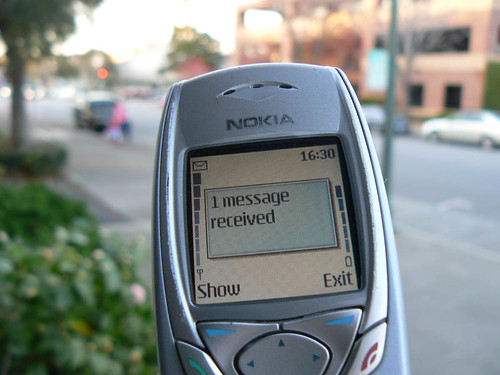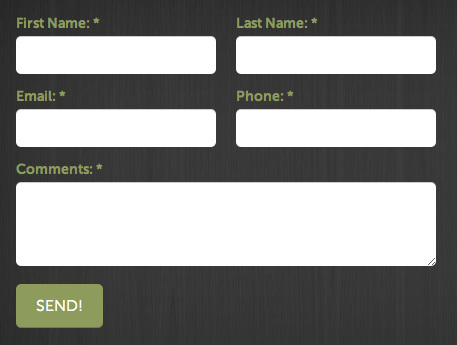This is a guest post from James Bentham.
SMS, really?
As most brands and organizations now have a mobile optimized version of their website, the focus is now on encouraging users to travel to your site and interact with the brand itself in order to push increased revenue.
Experienced marketers will tell you that customers are much more likely to respond to campaigns that engage them on a personal level. The marketing strategy must be relevant and timely while meeting the customer’s individual needs. In terms of rate of response, the simple SMS dominates the market. It can add real value to a marketing strategy and continues to grow with the decline in consumer spending. Marketers are being forced to find ever more cost effective ways of engaging with users.
A few statistics…
When you break down the figures involved in SMS marketing, the results can be quite staggering. Here a few examples:
- 77% of the population of the world own a mobile phone.
- Of all the SMS messages sent on a daily basis, 98% are opened, with 83% opened within 3 minutes.
- While only 6% of marketing emails are responded to, SMS campaigns have seen as much as 45% response rates.
- In other words, SMS has a higher response rate from direct communication than telemarketing, email, or post.
Why it Works
- Speed: SMS messages are delivered almost instantly, with the user engaged in a matter of seconds wherever they are in the world.
- Flexibility: The variety that SMS marketing offers is almost endless. Messages can deliver text alerts, subscriptions, broadcast advertising, competitions, campaigns for customer loyalty, customer profiling, cross-selling and reminders, the list goes on.
- Response: As previously mentioned, SMS campaigns have a very high response rate. This can be put down to the ease and speed by which users can reply, with relatively little effort.
- Personal: Messages can be easily customized to the demographic that they are targeted at, such as gender, age, location, activities, or preferences.
- Cheap: Lastly, and potentially crucially, SMS messages are cheap. Costing as little as $0.05 (2.5p) per message, there are few other methods than provide such a strong ROI.
Implementation
There are far too many ways of utilizing SMS marketing to list, but to give you an example, here are a few examples of potential implementations.
- Promotions/Offers
- Customers love to receive offers, especially if they don’t have to work for them. SMS messages allow retailers to deliver promotions and discount vouchers straight to their mobile, based on previous purchases from the brand.
- SMS enables delivery of offers via geo-fencing, which means a customer may only need to walk by a store or relevant location to receive a discount voucher via text, as long as they are opted in to the scheme.
- Customer Profiling
- If you already have a database of customer details, a simple profiling campaign can boost a marketing strategy and increase the amount of customer data you hold at the same time. Incentivize the exchange of key customer information in exchange for a prize or a discount voucher. This could include iPad, clothing or meal voucher giveaways.
- Reverse Auctions
- This involved giving something valuable away by allowing customers to make what they think will be the lowest unique bid for the product via text. Unsuccessful bidders receive a prompt to bid again, encouraging repeated interaction and numerous entries per customer.
- Receipts
- Sending customers receipts via SMS not only helps the environment by reducing paper wastage, but also allows you to attach details on competitions, cross selling promotions or surveys for example.
Getting Started
So you’ve decided you want to go ahead with an SMS marketing strategy, but where’s the starting point? Here are four easy to follow steps to get your scheme up and running.
Contacts
The first step is to build up a database of customer contact details if you don’t already have one. This isn’t as tricky as it may sound, as again you can incentivise the process. For example, ask new customers to register online in return for alerts, complete surveys or enter competitions which require certain contact details. Once you have acquired this list, it is important to segment and profile your customers in order to target certain groups correctly.
Make your customers feel like they’re part of an exclusive text club, rather than just a boring mailing list, by offering premium and exclusive content. This is how you’ll persuade them to part with their contact details.
For best practice though, always remember to offer an “opt out” tick box in email forms so customers do not receive unwanted correspondence.
Personalize your data by segmenting the contact database into demographics and specific target groups. For example, by gender, age, purchase history etc. This will then allow you to tailor your campaign to certain customers, increasing response rate and relevancy for the user. Targeting the wrong user for a campaign can be severely detrimental to your brand image so this is really worth doing.
Copy
Texts are limited to 160 characters so you need to be concise and to the point when getting your message across. The simplicity of an SMS is its appeal, so don’t try to be too technical. Do make sure you include an unsubscribe option, usually via a text back.
‘Calls to Action’ are essential within marketing texts. Ensure that you’ve made it completely clear what you want the consumer to do after reading your message. This could be a phone number, a link to a mobile website and ideally a time frame which will create a sense of urgency.
Platform
Choose a platform that can deliver both inbound and outbound marketing campaigns. Ideally, this system should be flexible and web based, allowing you to either create the campaigns yourself from scratch or offer a managed service to guide you through the process.
Tracking Success
In order to maximize your continued success with your SMS marketing campaigns, it’s vital that you track and report the results of the initial scheme. Set goals before the campaign is launched and ensure you know which metrics you want to focus on, such as recipients received and number of responses.
Monitor these variables throughout the campaign and if you are utilizing a multi-step delivery system, you can dynamically tweak your message to improve response rates.
Final Thoughts
Although now a slightly dated technology and less glamorous than an all-singing, all-dancing mobile app, SMS marketing schemes still have a place in a brand’s marketing strategy. The balance of high ROI to relatively cheap implementation cost make it great value for money and a very personal way of interacting with customers if done well.






You bring up very good points about SMS Text Marketing. My only concern is how many people are going to be willing to opt-in to a text message that markets them instead of email or social media? Do people really want their phones full of messages from marketers?
I recently wrote a blog entry on The Internet Conference about text marketing at http://www.theinternetconference.net/index.php/online-magazine/sms-text-advertising-not-a-good-idea/
Always makes me happy when folks talk about the upside of responsible SMS marketing (not that crappy spam stuff that comes through every so often and makes me angry).
SMS can be particularly powerful in consumer segments that are more prone to use SMS than email. Think of industries like landscaping, construction, or trucking/shipping/couriers. These folks are on the go and not as likely to check email as they are to check SMS.
I think the headline figure of 45% response rate sounds very seductive but is it true?
The best example of this working I’ve heard about is by BMW for snow tyres http://www.mobilemarketer.com/cms/news/messaging/2987.html where BMW targeted existing drivers, making the message relevant to their actual car and at the appropriate time of year & great recommendations and they got a 30% response rate.
It has to be permission based marketing, which I think is the future.
The worst offended for spamming me with SMS is the carriers themselves, but yes starting to receive more promotional texts. But as they are unsolicited “my response” is usually “STOP!”
I remember watching Eric Schmidt of Google say CMO’s are having to be more like conductors, using different forms/channels to message customers at the appropriate time to get a brands core message across.
Interesting times ahead, but please make what ever messages you send relevant and of interest, otherwise we as customers will turn away from your brand.
Good luck guys
It’s going to get trick from a legal angle on if people are receiving marketing texts and they didn’t opt-in. The FCC regulates it since it goes over a phone network, as well as other federal spam guidelines. They are going after companies for spamming text messages. I personally a lawyer in Dallas who is involved in a huge lawsuit case right now over this very issue. I’m just not sure it’s worth the energy for the opt-in when you social media and email for marketing?
Hi all,
I definitely agree about opt-in SMS marketing being the only way to go about it. Spammy, unwanted texts only serve to annoy the recipient and harm your brand. On the other hand, with targeted and relevant messaging, SMS provides a quick easy way of encouraging customer interaction.
Daniel, the figure of 45% is high but is a level that some of my client’s customers have experience in their campaigns.
As Hugo says sometimes people don’t have the time to answer to emails but will be more tempted to send a quick text in return for some sort of incentive.
So the bottom line really is to collect as much information about your customers as possible, in order to deliver the most specific and personalised campaigns.
James
Until there will be a good solution for dealing with unsolicited SMS, spammy unwanted messages will end up harming everyone’s brand in the long run – even those that play by the rules. Legislation and recent (very costly) class action lawsuits might help.
I’ve recently started blogging my research on this other SMS gateways related issues on http://www.smsgateways.info
Amnon
I think this is a good solution though. By offering incentives to customers in exchange for information you can create targeted campaigns, so that the customer will be rewarded for opting into the scheme and be much more receptive to contact in this way.
SMS marketing is a very successful means of communication as a wide range of customers can be reached anywhere through their mobile phones. A current analysis regarding Text Marketing shows that 95% of the marketing messages are read which proves how efficient they are compared to the conventional marketing methods